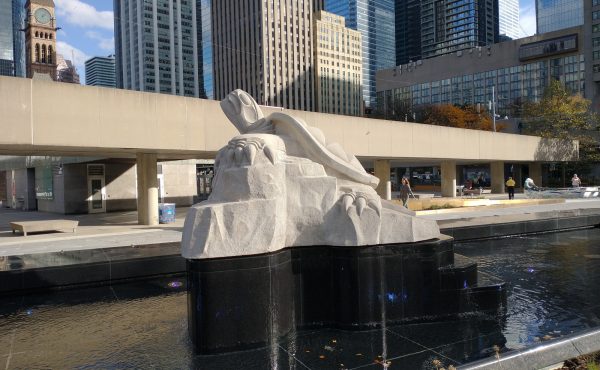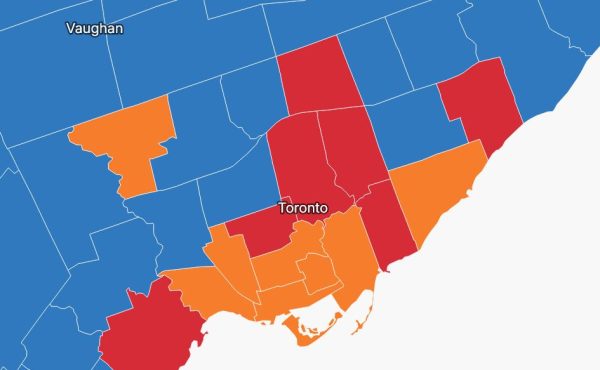The Toronto Sun published a rather thoughtful piece by Councillor Mike Del Grande about the need for a new deal for all Ontario cities in today’s print edition (unavailable on the web.) If you ignore the whiney tone of the article and the hard-to-believe claim  that Mississauga has taken over Toronto as the “banking capital,” Del Grande’s commentary is a pleasant surprise. In it, the Scarborough-Agincourt councillor finally takes a step beyond the dishonest claim he and his conservative cohorts on Council make that Toronto just needs to get its “fiscal house in order.”
that Mississauga has taken over Toronto as the “banking capital,” Del Grande’s commentary is a pleasant surprise. In it, the Scarborough-Agincourt councillor finally takes a step beyond the dishonest claim he and his conservative cohorts on Council make that Toronto just needs to get its “fiscal house in order.”
Del Grande’s proposal for a “new deal” would eliminate property tax all together and have the provincial government fund cities on sales, consumption and income taxes. According to Del Grande, money should be doled out based on a forumla that considers socio-economics, immigration, public transit and other factors that determine a city’s needs.
The only major problem I have with Del Grande’s plan is that it means the provincial government would be relied upon for virtually every cent the City spends. This means we would get many more Subways to Nowhere and very little Transit City.
But I’ll give Del Grande some credit for not positioning his version of a “new deal” as the substitute for new taxes. Though he is on record opposing the taxes, even Del Grande knows his long-term vision for Toronto can’t fix the immediate challenges facing the City.
If you happen to be near a copy of the Sun, the article is on page 22.
Worth reading
If you enjoy following City Hall, Toronto Community News’s City Hall reporter David Nickle keeps a blog worth reading on his trials and tribulations in the Clam Shell. The Art of the Improbable: A journal of politics and people at Toronto City Hall includes Dave’s characteristically dry sense of humour and is generally written under the assumption that you already know the news. I particularly enjoyed this entry based on an exchange Dave orchestrated between Councillor Denzil Minnan-Wong and the Toronto Environmental Alliance’s Katrina Miller.




6 comments
I don’t agree with completely abolishing property tax but I’d prefer to see it rebased on impact, so (for instance) larger lot sizes would pay more. A lot of property owners in the city aren’t based here so they might be able to escape taxation for stuff like fire/police etc. if their sales/income taxes were collected in another municipality.
Abolishing taxes is dangerous, as specific taxes encourage and discourage different behaviours. Some encourage spending, some encourage saving, some encourage entrepreneurship, etc.
Del Grande’s idea is magnifico! It’s exactly how schools are funded. And that works greeeeeeat…
All sarcasm aside, the time has certainly come to talk about which taxes we want to levy. I’m with Leo, in the sense that we should really be taxing and charging fees for behaviours we want to diminish.
Do we want to discourage people from owning property in the city? Hmmm… if the answer is no, then maybe Mr. Del Grande’s suggestion has some merit. Do we want to discourage people from buying and re-selling many many properties every year? Perhaps the land-transfer tax isn’t so crazy… Do we want to discourage people from commuting by car every single day? Hmmm maybe some kind of a mileage metre with GPS in the car would be good that taxes driving at certain times of day and in certain zones. Maybe even parking could be calculated by GPS!
But ANY scheme that sees the province collect the money and redistribute it to the cities is doomed to destroy the city of Toronto the way Harris/McGuinty decimated the schools in our city. Here’s how the scenario would play out:
The province collects our income and sales taxes, and then the province’s governing party then distributes money to the 400+ municipalities. Does the governing party put it back in the city/town where it came from? No. It does it in Harris/McGuinty style by tweaking its funding formula to deliver money to the spots in the province where it wants to win votes, or to reward its ‘base’. If you want to get technical: the way McGuinty rewards 905ers on the backs of Toronto school kids currently is by funding each school board’s payroll based on the average cost of school staff in the province. Toronto has more experienced and qualified teachers than the 905, so the REAL payroll costs are higher. Every year for 10 years now, Toronto schools had to top up this wrong amount they get from Queens Park with money from elsewhere in the operating budget: things like building maintenance and books and pools and… ESL! Yes, it’s deeply troubling and unethical. Suburbs that are growing and hiring new teachers (whos salaries start well below the provincial average) actually get more money from Harris/McGuinty for their school payrolls than they need. They can spend this money on anything they want. Like regular maintenance of buildings and some really amazing perks. So there IS a formula, and it’s based on average cost which SEEMS fair, and it has taken Education off the property tax system (which was really a first step towards Del Grande’s sceme), and the province will tell you they top it up based on NEEDs and ESL and poverty and everything. But really the province just robs Peter to pay Paul.
Provincial funding of municipal programs is done dishonestly and it’s a total fiasco in Education.
Nothing could be more foolish or dangerous at this juncture than to surrender taxation power to Queen’s Park.
An interesting 19th century economist named Henry George thought that government should collect revenues exclusively through property taxes. His 1879 book “Progress and poverty” proposed (copied from Wikipedia):
“that a sizeable portion of the wealth created by social and technological advances in a free market economy is captured by land owners and monopolists via economic rents, and that this concentration of unearned wealth is the root cause of poverty.
George considered it a great injustice that private profit was being earned from restricting access to natural resources while productive activity was burdened with heavy taxes, and held that such a system was equivalent to slavery – a concept somewhat similar to wage slavery.
The appropriation of oil royalties by magnates of petrol-rich countries may be seen as an equivalent form of rent-seeking activity: since natural resources are given freely by Nature rather than being products of human labor or entrepreneurship, no single individual should be allowed to acquire unearned revenues by monopolizing their commerce.
The same holds true about every other mineral and biological raw resource.”
For more information about this theory, look up “land value tax”.
I had a hard time finding cities that did not levy property taxes but did turn up a report from 2004 Cities Without Property Taxes: A Source of Inequity? from the Tennessee Advisory Commission on Intergovernmental Relations. This is what the study reported:
There are 84 cities in Tennessee that do not levy property taxes. Property taxes are a major source of revenue for cities, and cities that do not levy them are limited in the amount of own-source revenue they are able to generate ( business taxes, sales taxes, motor vehicle license taxes, miscellaneous revenue such as fines and forfeits, special assessments, and rents).
These cities are also generally more dependent on state-shared taxes to maintain their current level of spending and they provide fewer services to citizens. Though cities without property taxes do not tax themselves to the same degree as cities that levy property taxes, all cities receive state-shared tax distributions based on the same formulas. These factors may indicate an inequity in the state tax sharing process.
In fact many of the ‘cities’ studied in this report were very small and so far as I know New Yorkers pay property taxes, Londoners pay property taxes, Parisians pay property taxes and Berliners pay property taxes, but you know Ontario could model itself after Tennessee.
There’s a political logic to Mike Del Grande’s plan. Since cities can count on a tax distribution from the province municipal politicians run on a platform of dropping property taxes altogether or lowering them considerably. In some cities those politicians do well. In those cities municipal revenue goes down. Service goes down. Government gets blamed.
At this point the province has complete control of shared tax revenues. As well the province can abrogate the right to set other municipal tax levels or direct expenditures. Mike Harris liked the use of ‘envelopes’ when he reconfigured education funding.
I’m certain Mike Del Grande clings to ideological positions left over from those happy Harris years: gut-until-the-public-system-breaks; privatize-so-somebody-can make-a-profit, oh yeah and along the way break-the-public-service-unions.
As a trustee and chair on the Catholic School Board Del Grande was very clear about his support for the centralized education funding imposed by Mike Harris. Centralized tax sharing was used to gut the education system. The Harris government did not believe in the provision of public services.
Mike Del Grande is most himself when deriding government. As he goes to meet his maker he’ll still be wailing, “Taxpayers money wasted! Wasted!†I don’t understand why he got involved with municipal politics; Like Denzil Minnan-Wong, fundamentally, he doesn’t believe in what he does.